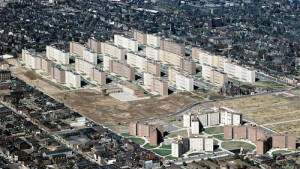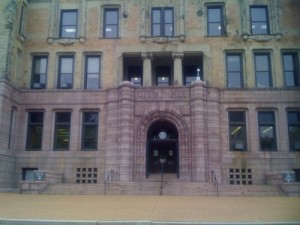Opinion: St. Louis’ Government Structure Has Failed City/Region and Generations of Most Vulnerable Residents

Construction on St. Louis’ city hall began in 1890, completed in 1904. The design reflected the form of government the city had at that time:
When City Hall was designed, St. Louis had a bicameral form of government similar to the Missouri Legislature. The building originally had chambers and meeting rooms for the House of Delegates and the City Council. The 1914 City Charter eliminated the Council and changed the House of Delegates to the Board of Aldermen. The room that once housed the Council is now the Board of Public Service Chamber, and the Board of Aldermen occupy the House of Delegates chamber and committee rooms. The Mayor´s office remains in its original space on the northeast corner of the second floor.(Source)
The 28-member “Board of Alderman” has existed for 108 years of the city’s nearly 254-year history, the most recent 43%.
In 1914, by popular vote, the city adopted what was known as the Charter of 1914 which kept the wards at 28 with a single legislative body and one alderman from each ward elected at large. These elections were replaced by ward elections in 1943. The Charter of 1914, along with popularly voted amendments, is still in effect today.
Present Day – On November 6th, 2012, Proposition R was passed with 61.49% of the vote to amendment the charter of the city of St. Louis to restructure the board of aldermen to a body of Fourteen (14) aldermen representing Fourteen (14) wards, providing a transition schedule for such changes to begin January 1st, 2022. You can view the original Board Bill and resulting Ordiance 69185. (Source)
Though not yet verified, my suspicion is the city was divided into 28 wards beginning with the 1876 divorce from St Louis County — when the current city limits became fixed.
Interesting that from 1914 to 1943 all 28 aldermen were elected at large, one per ward. Can you imagine if candidates for each ward had to win a city-wide election today? For the last 75 years the voters of each ward has elected one alderman to represent them.
The 1940 census showed first time drop in population for a city that had been growing exponentially for over 175 years. The Republicans & Democrats that ran city hall thought it was just a fluke. The 1947 Comprehensive Plan predicted a 1970 population of 900k. The increased 1950 census of 856,796 affirmed to the city’s leaders — Republicans & Democrats — that the city was growing perhaps even faster than estimated just 3 years earlier. Since the 1940 census they’s gained 50,000 residents. Instead of reaching 900k by 1970 the city lost over 234k.
Decade after decade of aldermanic courtesy treated the city as 28 fiefdoms rather than one city. Patronage jobs and scores of old timers teaching newcomers about how things have always been done led to bad decision after bad decision.
We should be talking about the form of our municipal government and how to change it so it functions better, produces positive results, and represents the best interests of the just over 300k of us who remain. Just reducing the board from 28 to 14 isn’t the right answer — just as sticking with 28 isn’t either.
The results of the recent non-scientific Sunday Poll:
Q: The ideal number of wards/aldermen for St. Louis is:
- 29 or more: 0 [0%]
- 28: 2 [6.25%]
- 15-17: 2 [6.25%]
- 14: 9 [28.13%]
- 13 or less: 19 [59.38%]
- Unsure/No Answer: 0 [0%]
Do really think the structure created in 1914 — highly segregated times in St. Louis — is the best we can do? I say start over from scratch and design a governance structure that works for the present conditions, population, etc.
— Steve Patterson

